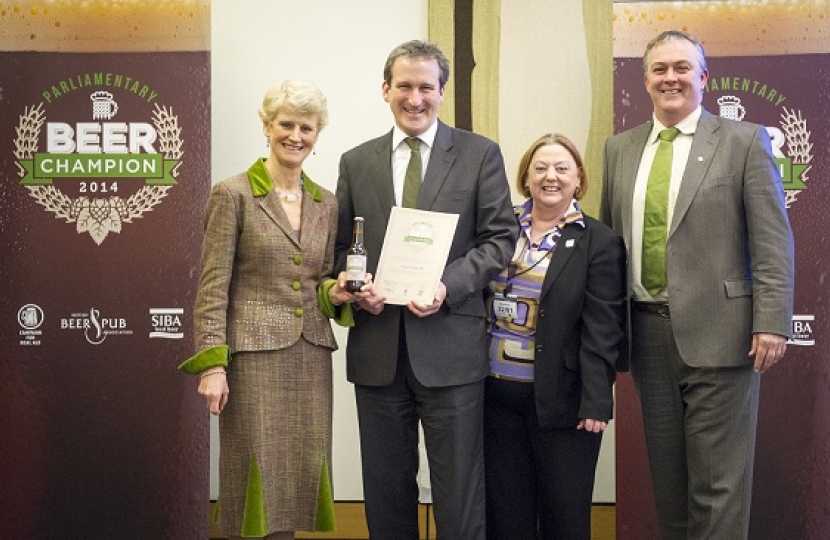
Damian Hinds called for a new type of partnership between pubs and licensees in an effort to reduce the number of pub closures in a debate in Parliament this week.
Damian began his speech by outlining the importance of pubs to East Hampshire, naming “community hubs” such as the Fox and Pelican at Grayshott and the White Hart at Holybourne and “beautiful countryside pubs that form part of our national image and attract people to visit this country” such as the Queens and the Selborne Arms, the Greyfriar at Chawton, the Harrow, the Trooper and the Pub With No Name.
Pubs are also of huge financial benefit to the local economy. Research by Oxford Economics shows that pubs ass £35m to the East Hampshire local economy, and provide 1,396 jobs in the area.
However, Damian also noted the number of pub closures that the area has suffered, giving Alton and the surrounding area as an example, where closures have included the Gentleman Jim, the Railway Hotel and the Barley Mow. He also mentioned “the two pubs in Ropley – the Chequers and the Anchor – and, just recently, the only pub in Four Marks, the Windmill.”
There are a number of factors in pub closures, including the popularity of wine at home and the wide price gap between on-trade and off-trade sales.
According to research by R3, the insolvency trade body, the proportion of businesses in the UK pubs and bars sector at risk of insolvency in the next 12 months is much higher than in the rest of the economy; the South East has the highest share of ‘at risk’ businesses in the industry at 41%.
The key is to ensure that licensees and pub owners have a mutually beneficial relationship, with pub companies looking at pubs as long-term operations rather than just as real estate assets.
The government can assist with this by making it harder for food and drink establishments to be converted to residential property, Damian argued.
He also said that it is right for pressure to be put on pubcos in other ways too. One key role for government is to ensure that licensees can get proper financial and legal advice ahead of signing. Damian said that it is vital that potential publicans are able to understand and challenge the financial assumptions that underpin the rent – including what is deemed to be the potential sustainable revenue at the pub. Pre-entry training is vital too and thereafter pubcos can add more value than up to now with food development consultancy and enhanced purchasing programmes for example.
Damian also called for a review into the community “right to bid” for pubs, so that it is made as simple as possible for communities to be able to apply to take over and save failing pubs.
Damian Hinds comments:
“Pubs are a vital part of communities around East Hampshire; they really provide an irreplaceable hub for those that live in the area.
“It is important that the government does what it can to help the pub industry, and one way that pub closures could be prevented is by making it harder for large pubcos to sell them for conversion into residential properties. However, it is also essential that pub companies and licensees work in partnership to ensure that individual pubs thrive.
“Some communities in East Hampshire have really stepped up and fought for suitable options when their pubs’ existences have been threatened; one example is the Anchor in Ropley, which was listed as an asset of community value by the Council after an application was submitted by locals. However, we must ensure that the process is as straightforward as possible so that other communities can do the same and have a reasonable chance of ultimate success.
“I also know of cases where a lessee or tenant believes they have been unfairly treated or misled by the pubco when they have sunk their life savings and more into the business. To deal with these cases we need to look at some form of adjudication service.”
The full text of Damian’s speech can be found here: http://www.publications.parliament.uk/pa/cm201314/cmhansrd/cm140121/debtext/140121-0001.htm#14012168000001
Separately this week Damian was presented with a specially brewed ale as one of the ‘Parliamentary beer champions’ for his support for pubs and beer, and especially over scrapping the Beer Duty Escalator, which led to the momentous cut in Beer Duty. The awards are a joint initiative between the British Beer & Pub Association and the Campaign for Real Ale (CAMRA).

